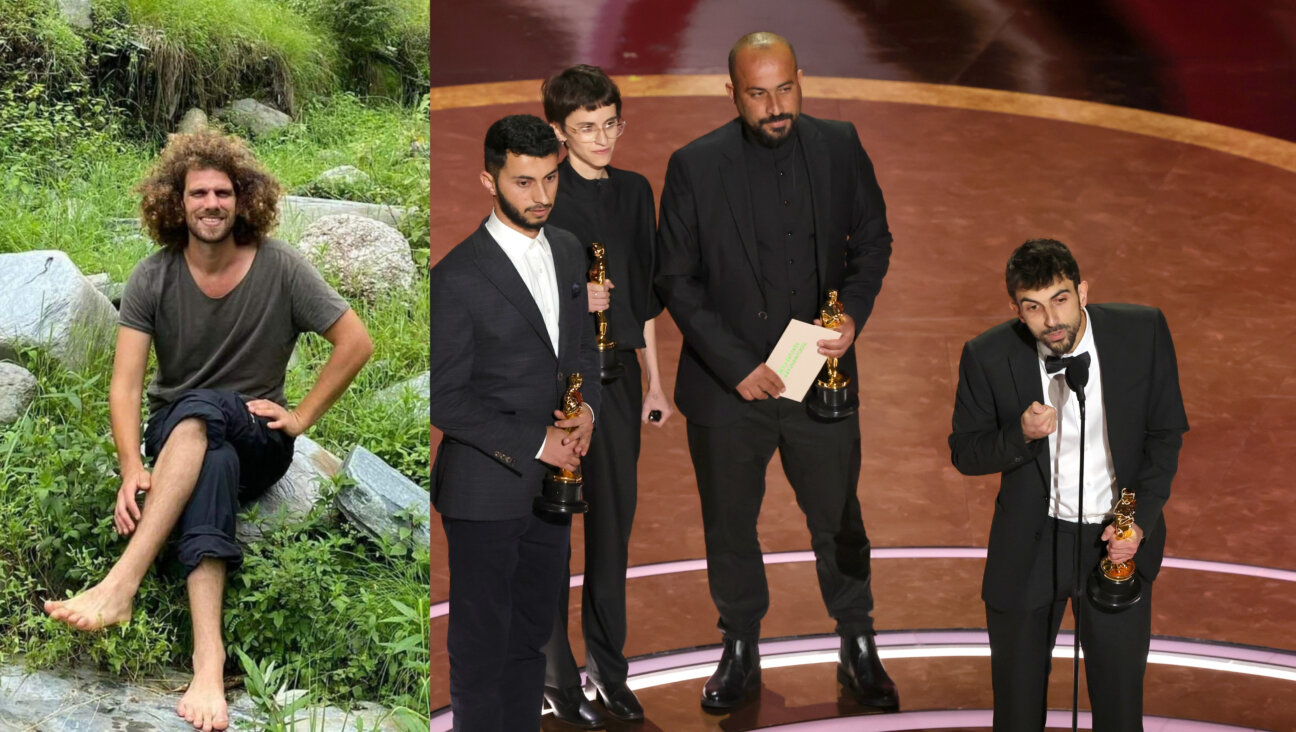Invisible Revisions

Por Dentro y Por Fuera (?From Inside and Outside?) Image by MIRTA KUPFERMINC, 2007
My American-Jewish childhood may have been typical: Friday night dinner was followed by 20/20 on TV, Saturday morning synagogue often preceded a trip to the mall. I went to a Conservative Jewish day school where controversial topics were often discussed openly, though not interfaith dating or marriage. The implied assumption was: We were expected to marry other Jews.

Por Dentro y Por Fuera (?From Inside and Outside?) Image by MIRTA KUPFERMINC, 2007
My Jewish observance has fluctuated over the years, but by the end of college things had started to slip. I was changing, but I couldn’t map the changes, or provide a solid, philosophical reason for them. Like the body, which replaces all its cells every seven years, the mind engages in invisible revisions we scarcely notice. The notion that I must marry a Jew hung in the air around me, as though the ideal partner were a leaf on a branch that began to appear higher and higher up on the tree, to the point that I soon couldn’t see or remember the leaf’s color.
By the time I turned 27, I had met a non-Jew who I considered dating. I thought about what a potential relationship might mean, but in the end, I went with my heart, leaping into the unknown. I told him on our first date that I had, in the past, tried only to date Jews. But when he asked why, I fumbled, unable to answer. I knew I wanted to raise my children Jewish. I wanted to celebrate holidays and Shabbat without being fully “observant.” I wanted to practice and pass down Jewish teachings on social and economic justice. And it dawned on me that perhaps it is possible to have all these things with a supportive non-Jewish partner.
After a year together, I’ve discovered he’s someone who, oddly enough, gets my quirky version of Judaism. He jokes about editing out the violent parts of the Torah; I tell him: good luck. We argue about the existence of God. He participates in holidays with me. He stands by me when I do tashlich. He brings me bagels for my break-fast on Yom Kippur.
I understand why a strictly observant Jew would seek out a partner who has a similar level of observance, just like a strict vegan may choose to seek out a like-minded partner. However, if, like myself, you are not strictly observant, or your brand of spirituality is at times fervent, at times skeptical, there is room for flexibility.
I don’t fit easily into any part of the spectrum of Jewish identity available to modern Jews. I am not hippie enough for the neo-Hasidic, post-denominational, Renewal sect; but I can occasionally be found singing and dancing with fellow alternative Jews. I am not observant enough to be Orthodox; yet I enjoy Shabbat dinner with Chabad. Conservative Judaism is not radical enough for me; but I owe my Jewish identity to the Schechter school I attended and to the teachings of Abraham Joshua Heschel. I’m not Reform; I prefer hearing Hebrew in synagogue, and I don’t like the term “confirmation.” But I am grateful that the Reform movement is an option for so many Jews. I’m not Reconstructionist, because, philosophically, I can’t divorce Jewish theology from Jewish culture; but where would modern Judaism be without the work of Mordechai Kaplan? I’m not a secular Jew, because I believe in God, and I find value in certain religious practices. But I’m heartened that Jews who don’t feel comfortable with a supernatural deity have a community in which to share their skepticism, and to celebrate non-religious aspects of being Jewish. And finally, although I’m technically an Israeli-American, unfortunately, my Hebrew accent is abysmal and “real” Israelis have never hesitated to point that out.
Like many Jews in interfaith relationships, I have experienced opposition from family. At the same time, I began reading personal narratives of, and talking to, Jews in interfaith relationships, and found that most were committed to their Jewish identity and to sharing Judaism with their children, and their partners were supportive. I began to wonder why so many Jews who maintain the social taboo against intermarriage were religiously non-observant. Once the rigid technicalities of religious observance and a traditional religious belief system are stripped away, the core belief that remains is that Jewishness is a genetic identity, and that Jews are expected to marry other Jews solely for the purpose of perpetuating Jewish genealogy.
This biological idea flies in the face of my definition of being Jewish, which is not about genetics, but about practicing a set of ideals that will hopefully inspire the world to become a more peaceful place. The more I thought about tribal insularity, the more it felt like racism, and the more it felt like the opposite of what I stood for as a Jew. I am reminded of a quote by Heschel, which my mother gave to me years ago: “To be is to stand for.” The only kind of Judaism that I feel comfortable standing for is inclusive; a Judaism that aspires toward a world in which group insularity is secondary to peace.
We’re hung up on the question: Who is a Jew? We hear this in debates about conversion status in Israel and whether the mother or father determines the Jewish identity of their children. The question follows me around like a confused, lost puppy. We should be more interested in how to behave “Jewishly,” how to incorporate great Jewish teachings into our lives, than worrying about identity labels. Judaism helps me work toward becoming a more aware and empathic person. And so does my non-Jewish partner, who has boosted me closer to seeing that single leaf on the tree, whose particular shape and color are not what I expected.
Hila Ratzabi is the author of a book of poetry, The Apparatus of Visible Things (Finishing Line Press, 2009).
A message from our Publisher & CEO Rachel Fishman Feddersen

I hope you appreciated this article. Before you go, I’d like to ask you to please support the Forward’s award-winning, nonprofit journalism so that we can be prepared for whatever news 2025 brings.
At a time when other newsrooms are closing or cutting back, the Forward has removed its paywall and invested additional resources to report on the ground from Israel and around the U.S. on the impact of the war, rising antisemitism and polarized discourse.
Readers like you make it all possible. Support our work by becoming a Forward Member and connect with our journalism and your community.
— Rachel Fishman Feddersen, Publisher and CEO



























